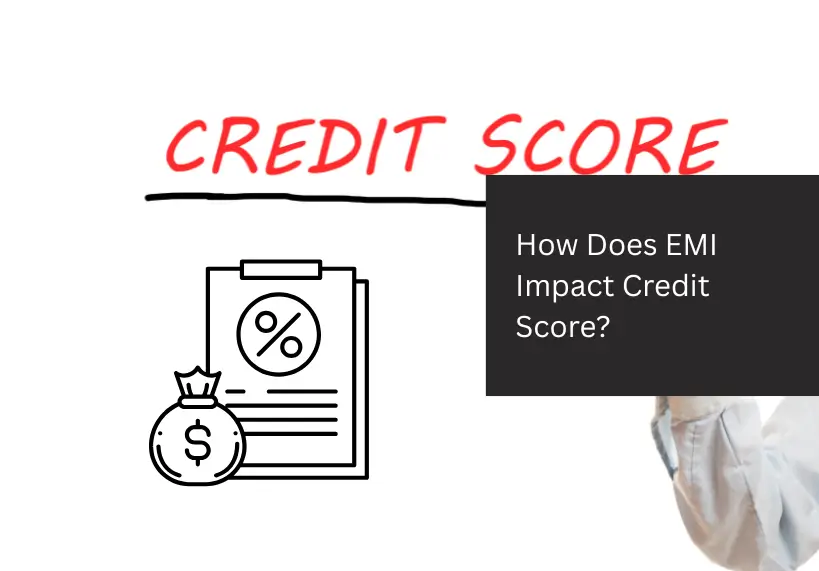
Ever wondered how EMI impacts credit score and why timely payments matter so much? Your EMIs (Equated Monthly Instalments) play a huge role in defining your financial credibility.
Paying them on time boosts your score, while missing them can pull it down faster than you expect. Whether it’s a loan or a credit card EMI, the way you manage these payments says a lot about your financial discipline.
What Are EMI Payments?
EMI, is the fixed amount you repay every month for a loan. It includes both principal and interest spread across a specific tenure. EMIs make borrowing easier by turning a large loan amount into small, manageable monthly payments that fit your budget.
But here’s the catch, while EMIs make loans affordable, they also directly affect your credit score. Every EMI you pay (or miss) gets reported to credit bureaus like CIBIL, influencing how lenders view your creditworthiness.
Positive and Negative Impact of EMI Payments on Credit Score
Positive Impact: When EMIs Work in Your Favour
Timely EMI payments can significantly boost your credit score. Here’s how:
- Builds payment history: Regular EMI payments prove that you’re financially responsible, which makes lenders more confident about lending to you again.
- Improves creditworthiness: A strong EMI track record shows consistency and reliability, helping you qualify for better loan offers and lower interest rates.
- Diversifies credit mix: Having a balanced combination of EMIs like credit card, personal loan, or home loan, positively contributes to your credit profile.
- Enhances credit limit opportunities: When lenders see consistent EMI payments, they’re more likely to increase your credit limit or offer pre-approved loans.
In simple terms, each on-time EMI acts like a green tick on your financial report card, moving you closer to achieving a good credit score that reflects responsible borrowing.
Negative Impact: When EMIs Turn Against You
Just as timely payments help, delayed or missed EMIs can seriously damage your score:
- Late payments: Even one missed EMI can reduce your credit score by 50–100 points.
- Defaulting on EMIs: If you repeatedly miss payments, lenders may classify your account as delinquent,a red flag that stays on your report for months.
- High EMI-to-income ratio: Taking on too many EMIs can signal financial stress, even if you’re paying on time.
- Overdependence on credit: Relying too much on credit-based EMIs can hurt your score if not balanced with income and expenses.
The takeaway? Paying EMIs late or missing them regularly sends a negative signal to credit bureaus, making it harder to get loans or credit cards in the future.
Tips to Improve Your Credit Score with EMIs
- Always pay on time: Automate EMI payments through bank auto-debit.
- Keep EMI-to-income ratio below 40%.
- Avoid unnecessary EMIs – don’t take loans you don’t need.
- Check your credit report regularly for any errors or late-payment entries.
- Prepay smartly when possible to reduce overall debt.
Managing EMIs wisely helps build a strong credit score and keeps you financially stress-free in the long run.
Conclusion
Every time you pay your EMI on time, it gives your credit score a healthy boost and reflects your sense of financial discipline. Consistent payments show lenders that you manage credit responsibly and can be trusted with future loans.
Remember, maintaining a strong credit score is about building positive financial habits over time, not a one-time achievement.
LoanTap helps simplify your financial journey with quick personal loans and a free credit score check. Visit LoanTap today to enjoy a seamless loan approval process within no time.
Frequently Asked Questions (FAQs)
1. Does paying EMIs on time improve my credit score?
Yes, timely EMI payments have a direct positive impact on your credit score. Regular on-time payments demonstrate financial reliability and help you build a strong credit profile over time.
2. What happens if I miss one EMI payment?
Missing even a single EMI can lower your credit score by several points and may also attract late payment fees. It’s best to set up auto-debit or payment reminders to avoid missing due dates.
3. How can I maintain a good credit score while managing multiple EMIs?
Keep your total EMI-to-income ratio below 40%, pay all EMIs on time, and avoid taking unnecessary loans. Consistency and financial planning are key to maintaining a good credit score.
4. Does prepaying a loan affect my credit score?
Prepaying a loan can positively impact your credit score if done smartly. It reduces your overall debt burden, though you should always check if your lender charges prepayment penalties.
5. How can LoanTap help improve my credit score?
LoanTap offers instant personal loans with flexible repayment options and free credit score checks. By choosing manageable EMIs and paying them on time, you can steadily improve your credit score.








